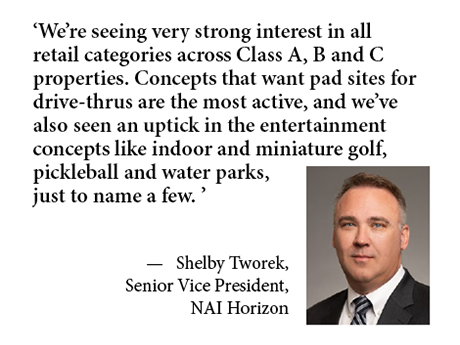Retailers, developers and leasing agents who attended the ICSC LAS VEGAS 2023 conference in May left the show cautiously upbeat about the state of retail. It was only the second consecutive gathering since the pandemic shut down the annual show in 2020 and 2021, and many brands made known their intent to remain in expansion mode, especially fast-casual restaurants, car washes, coffee shops, auto parts stores, entertainment concepts and medical services.

NAI Elliott
The only obstacle stopping them at this point is the higher rental rates that they may have to pay as a consequence of higher construction costs, says George Macoubray, vice president of retail brokerage for NAI Elliott in Portland, Oregon.
“A lot of these concepts are doing well,” declares Macoubray, whose Northwest Retail Advisors team represents landlords and regional and national tenants throughout Oregon and Washington. “We’ll see how far these tenants can go in terms of what they pay to fill new projects, but the enthusiasm and willingness to grow is definitely there.”
Practicing Vigilance
The same can’t be said for ICSC conference attendees who are on the capital markets side of the business. Higher interest rates have fueled a bid-ask spread between buyers and lenders, while regulatory scrutiny over bank lending and uncertainty about what properties are worth today have moved many lenders to the sidelines.
Retail investment sales through the first four months of 2023 totaled $19.8 billion, a 38 percent year-over-year decline, according to MSCI Real Assets, which tracks sales of $2.5 million and up. On the bright side, that was by far the smallest year-over-year sales decline when compared to the mainstream office, industrial and multifamily categories.
Capital market turbulence isn’t likely to affect expansion financing for publicly traded national retailers, who can tap existing funds and are intent on opening new locations, Macoubray notes. Additionally, retailers at the ICSC show aren’t anticipating an economic slowdown until late 2024 or early 2025, says Shelby Tworek, a senior vice president with NAI Horizon in Phoenix who represents retail landlords and tenants.
While developers have slowed ground-up projects due to construction costs, Tworek continues, those working on redevelopments continue to move forward, albeit with more caution. “Tenants are still moving ahead on deals, as well,” Tworek adds, “but they are also becoming more cautious.”
Tight Conditions
Still, a lack of new construction and limited available space are additional indications of positive retail momentum. In Phoenix, vacancy rates range from 4 percent to 8 percent across metro submarkets, Tworek notes. Over the last two years, grocery-anchored centers have surged to keep up with suburban growth, and fitness centers absorbed a lot of space. But that is beginning to change.
“We’re seeing very strong interest in all retail categories across Class A, B and C properties,” he points out. “Concepts that want pad sites for drive-thrus are the most active, and we’ve also seen an uptick in the entertainment concepts like indoor and miniature golf, pickleball and water parks, just to name a few.”
Similarly, retail vacancy rates are at historical lows around Oregon, which is challenging expansion-minded tenants, Macoubray reports. At the same time, the bankruptcies of companies like Bed Bath & Beyond Inc. and Tuesday Morning Corp. are opening up opportunities. Several tenants are already competing for Bed Bath & Beyond locations in the Portland area, and interest is growing in Tuesday Morning locations as well, he says. Like Phoenix, entertainment is driving much of the activity.
“Whether it’s golf, virtual reality like Sandbox VR or entertainment revolving around children, the concepts are out looking for locations and have increased demand for those spaces,” Macoubray explains. “You also still have interest from Ross Stores, TJ Maxx, Big Lots Stores, Hobby Lobby Stores and other brands that traditionally take big box space as it becomes available.”

Gael Zongazo, an associate who works on Macoubray’s retail advisory team, attended the ICSC LAS VEGAS conference. Like Macoubray and Tworek, he left the conference optimistic about the state of retail.
“For me, it was all about talking to tenants who want to expand into Portland, or who are at least thinking about it,” he says. “But my general impression is that our industry is doing very well overall, especially when you consider the uncertainty retail experienced during the pandemic.”
— By Joe Gose. This article was written in conjunction with NAI Global, a content partner of REBusinessOnline. For more articles from and news about NAI Global, click here.


